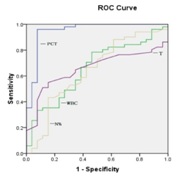The Role of Procalcitonin in the Diagnosis and Prognosis of Severe Surgical Patients with Sepsis
Abstract
Purpose:To investigate the clinical significance of serum procalcitonin (PCT) concentrations and related indicators of infection in the early diagnosis and prognosis of severe surgical patients with infection.
Methods: This study included 77 critically ill patients taken from the Surgery Department to the Intensive Care unit between June 2015 and July 2017. Patients were divided into control, sepsis and septic shock groups, and their serum concentrations of PCT and related indicators of infection were compared.
Results: PCT levels increased significantly from the control to the sepsis group and from the sepsis to the septic shock group (P<0.01 each). There were no significant differences in white blood cell (WBC) count, neutrophil percentage and body temperature among the groups (P>0.05). Receiver operating curve (ROC) analysis showed that the areas under the curve (AUC) for PCT, WBC count, neutrophil percentage and body temperature were 0.949, 0.657, 0.640 and 0.656, respectively. PCT, with 0.52 µg/L as the cut-off concentration, had the highest performance in the diagnosis of severe surgical sepsis, with a sensitivity of 96.1%, a specificity of 92.3% and a Youden index of 0.884.
Conclusion: PCT concentration is diagnostic of infection in severe surgical patients, has high specificity in the early diagnosis of sepsis, and can reflect the severity of infection.
Downloads
References
TheerasukKawamatawong, WisarnJintanalert. Serum procalcitonin (PCT-Q) as a diagnostic tool for bacterial lower respiratory tract infection among COPD patients with acute exacerbation. European Respiratory Journal 2013 42: P2072.
Müller B, Becker KL, Schächinger H, et al. Calcitonin precursors are reliable markers of sepsis in a medical intensive care unit. Crit Care Med. 2000 Apr;28(4):977-83.
Rajkumari N, Mathur P, Sharma S, et al. Procalcitonin as a predictor of sepsis and outcome in severe trauma patients: a prospective study. J Lab Physicians. 2013 Jul;5(2):100-8. doi: https://dx.doi.org/10.4103%2F0974-2727.119852.
Jolivet P, Christen G, Seematter G, et al. [Usefulness of biomarkers of sepsis in the ICU]. Rev Med Suisse. 2011 Dec 14;7(321):2430-4.
Layios N, Lambermont B. Procalcitonin for antibiotic treatment in intensive care unit patients. Curr Infect Dis Rep. 2013 Oct;15(5):394-9. doi: https://doi.org/10.1007/s11908-013-0360-2.
Assicot M, Gendrel D, Carsin H, et al. High serum procalcitonin concentrations in patients with sepsis and infection. Lancet. 1993 Feb 27;341(8844):515-8.
Sakran JV, Michetti CP, Sheridan MJ, et al. The utility of procalcitonin in critically ill trauma patients. J Trauma Acute Care Surg. 2012 Aug;73(2):413-8; discussion 418. doi: https://doi.org/10.1097/TA.0b013e31825ff5b7.
Nandini Mahadev, Shoukath Abdul Raheem, et al. A study of serum procaltitomin(PCT) as a diagnostic biomarker in sepsis in ICU. Journal of Evidence Based Medicine and Healthcare. Volume 4, Number 13, 2017, 730-734(5)
Vincent JL, Van Nuffelen M, et al. Host response biomarkers in sepsis: the role of procalcitonin. Methods Mol Biol. 2015;1237:213-24. doi: https://doi.org/10.1007/978-1-4939-1776-1_16.
Stocker M, van Herk W, El Helou S, et al. Procalcitonin-guided decision making for duration of antibiotic therapy in neonates with suspected early-onset sepsis: a multicentre, randomised controlled trial (NeoPIns). Lancet. 2017 Aug 26;390(10097):871-881. doi: https://doi.org/10.1016/S0140-6736(17)31444-7.
Huang DT, Yealy DM, Filbin MR, Procalcitonin-Guided Use of Antibiotics for Lower Respiratory Tract Infection. N Engl J Med. 2018 Jul 19;379(3):236-249. doi: https://doi.org/10.1056/NEJMoa1802670.
Heredia-Rodríguez M, Bustamante-Munguira J, Fierro I, et al. Procalcitonin cannot be used as a biomarker of infection in heart surgery patients with acute kidney injury. J Crit Care. 2016 Jun;33:233-9. doi: https://doi.org/10.1016/j.jcrc.2016.01.015.
Luzzani A, Polati E, Dorizzi R, et al. Comparison of procalcitonin and C-reactive protein as markers of sepsis. Crit Care Med. 2003 Jun;31(6):1737-41.DOI: https://doi.org/10.1097/01.CCM.0000063440.19188.ED.
George EL, Panos A. Does a high WBC count signal infection? Nursing. 2005 Jan;35(1):20-1.
Hotchkiss RS, Moldawer LL, Opal SM, et al. Sepsis and septic shock. Nat Rev Dis Primers. 2016 Jun 30;2:16045. doi: https://doi.org/10.1038/nrdp.2016.45.
Becker KL, Nylén ES, White JC, et al. Clinical review 167: Procalcitonin and the calcitonin gene family of peptides in inflammation, infection, and sepsis: a journey from calcitonin back to its precursors. J Clin Endocrinol Metab. 2004 Apr;89(4):1512-25.DOI: https://doi.org/10.1210/jc.2002-021444.
Kopterides P, Tsangaris I. Procalcitonin and sepsis: recent data on diagnostic utility prognostic potential and therapeutic implications in critically ill patients. Minerva Anestesiol. 2012 Jul;78(7):823-35.
Meisner M. Pathobiochemistry and clinical use of procalcitonin. Clin Chim Acta. 2002 Sep;323(1-2):17-29.
Hohn A, Schroeder S, Gehrt A, et al. Procalcitonin-guided algorithm to reduce length of antibiotic therapy in patients with severe sepsis and septic shock. BMC Infect Dis. 2013 Apr 1;13:158. doi: https://doi.org/10.1186/1471-2334-13-158.
Bloos F, Trips E, Nierhaus A, et al. Effect of Sodium Selenite Administration and Procalcitonin-Guided Therapy on Mortality in Patients With Severe Sepsis or Septic Shock: A Randomized Clinical Trial. JAMA Intern Med. 2016 Sep 1;176(9):1266-76. doi: https://doi.org/10.1001/jamainternmed.2016.2514.



 OAI - Open Archives Initiative
OAI - Open Archives Initiative


